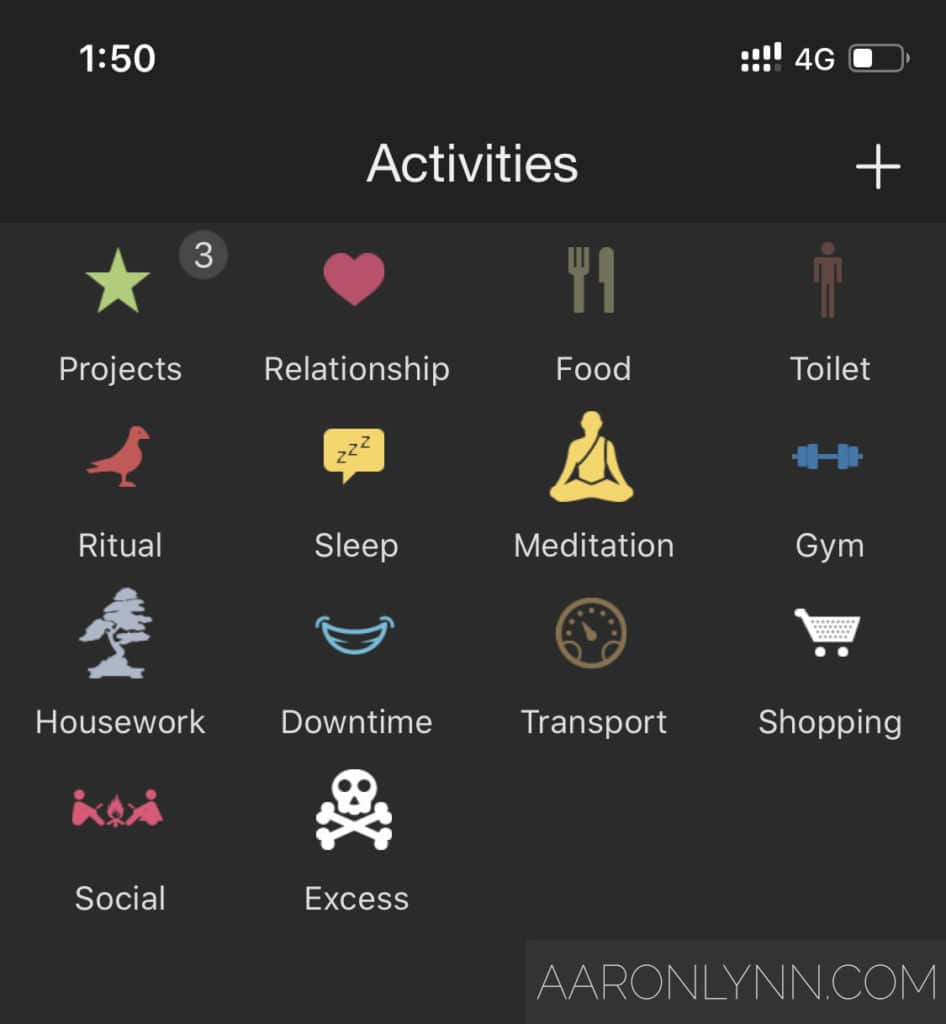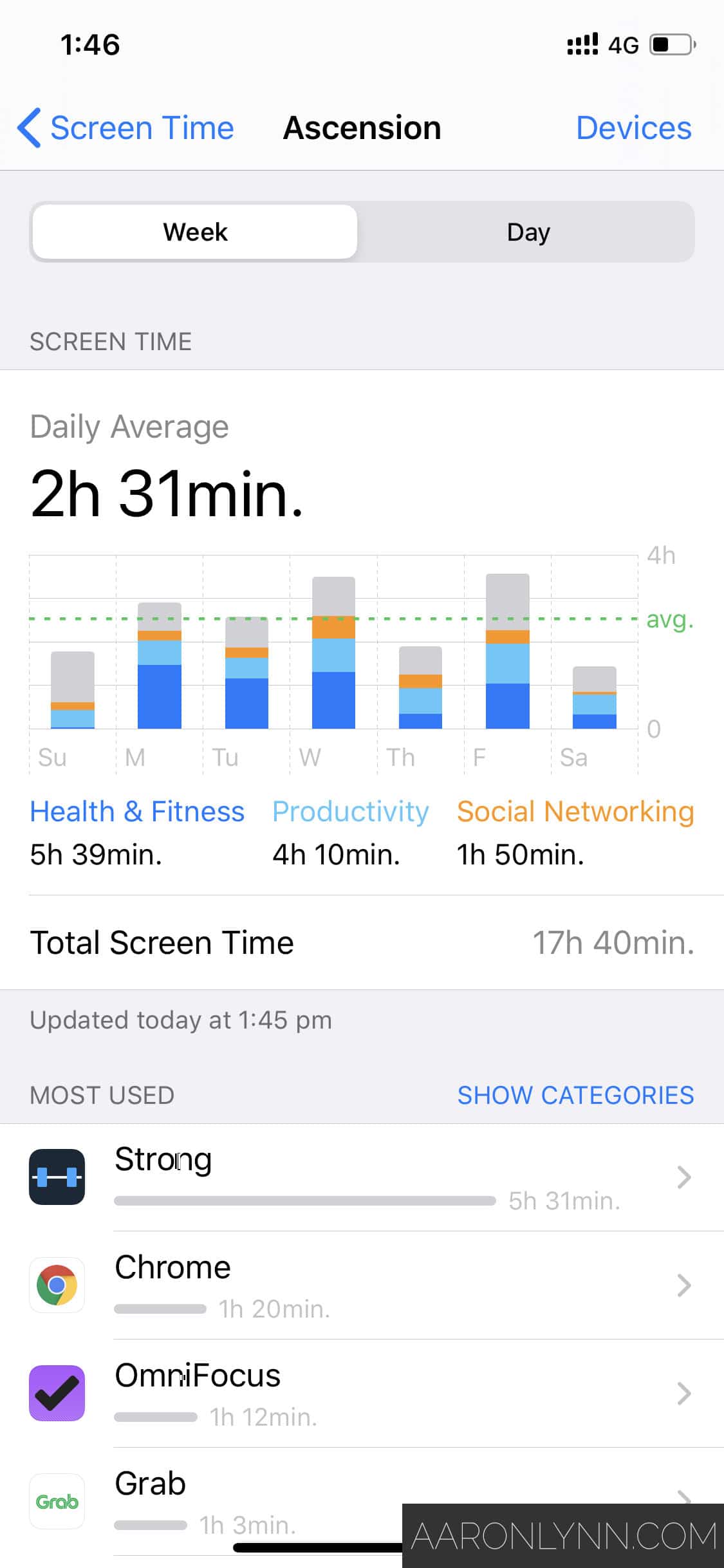Time tracking is the art and science of accounting for every minute of every day for the rest of your life.
I know what you’re thinking:
Aaron, what kind of compulsive crazy person are you?
Whenever I tell people about time tracking they start off with the same reaction.
But then they try it.
And one of two things happens:
- They come back with a “holy sh*t this is amazing!”, or
- They go quiet and never mention it again, because they’re too busy optimising their time.
Wait, But Why Should I Track My Time?
There are many reasons to track your time.
Let’s start with the Hawthorne Effect.
The Hawthorne Effect
There’s a reactivity effect in psychology called the Hawthorne Effect.
The effect refers to experiments conducted at the Hawthorne Works telephone factory in Illinois in the 1920s.
As the story goes, a set of productivity consultants was brought in to see how worker output could be increased.
They tried many things.
They turned up the lighting, thinking that worker productivity would go up.
It did.
They added in break times, thinking that worker productivity would go up.
It did.
They introduced free food during lunchtimes, thinking that worker productivity would go up.
It did.
They turned down the lighting to pre-experiment levels, thinking that worker productivity would go back down.
It didn’t. It went up.
They took away the break times.
Productivity went up again.
They took away the free food during lunch times.
Productivity went up yet again.
They returned everything back to the original working conditions… and productivity stayed up.
No matter what was changed – good or bad – worker productivity would go up.
This is the Hawthorne Effect and it states that when something is tracked and given special attention… productivity goes up.
It is an in-built feature of human psychology that when we know something is being measured, we subconsciously try to perform better at that thing.
Which brings us to time tracking.
When we track our time, we are abusing using an aspect of human psychology to our advantage. The simple act of tracking our time means that we subconsciously improve how we use it.1People like to talk about “life hacks”. Time tracking in this case is as close as it gets to being a true life hack.
Other reasons for time tracking
But time tracking goes beyond just subconscious improvements.
It very quickly highlights how you spend your hours and days – and the things that you value, or don’t.
It may also act as the impetus you need to make changes in your health, career, relationships or other areas of life.
You will find that when every minute and second is under scrutiny, a lot of BS rationalisations disappear because it becomes impossible to excuse the loss of time.
“It’s just a quick read of Reddit” adds up to an hour of your day.
“I’m just staying updated on what’s going on with my friends” becomes ten minutes on Instagram here, fifteen minutes on Facebook there… and your work time is cut by an hour every day.
How to Set Up Time Tracking
The first thing you will need is a time tracking application.
I personally like timetrack.io. It is simple to use and has an Apple Watch app as well.2The Watch app is useful for quickly switching activity categories on the go.
I suggest sticking with an application on your phone as you will likely have it with you all the time.3Sync functions with computer are cool and all but you may end up with duplicate data which is not cool.
The second thing you want to do is to configure the application.
You want to only track one activity at a time. This means when one category starts, the other one stops.
The third thing you want to do is set up your activity categories.

Here is a list to start – be sure to customise it based on what you do:
- Personal Projects.
- Work.
- Learning.
- Food.
- Bathroom/Toilet.
- Rituals.
- Sleep.
- Meditation.
- Gym/Exercise/Sport.
- Housework.
- Downtime.
- Commute/Transport.
- Shopping.
- Social.4You can include family time and/or dates here, or break them out if you want to track them separately.
- Excess.5Things you really don’t want to do but are forced to do. Visiting the ER, dealing with the government etc would fall under this category.
How to Track Your Time
Once you are all set up to track your time, you just need to track it.
I suggest gathering one week of data before reviewing it.
And then sit down and review it.
Ask yourself:
- What did you spend the most time on?
- Was there anything unexpected?
- Is there anything you should spend less time on?
- Is there anything you should spend more time on?
- Is there anything that you stopped yourself from doing, because you knew you had to track the time spent on it?
Keep working with a weekly review timeframe and make adjustments as you go.
Frequently Asked Questions About Time Tracking
What happens if an activity falls into multiple categories?
Just ask:
Would I normally do this activity anyway?
If the answer is yes, then track the normal category, not the extra category.
An example of this would be having dinner with friends. This could fall in both the Social and Food categories.
In this case you would normally have to eat dinner anyway, so you want to track Food.
But once dinner is over and you are spending one-to-two hours talking over drinks, that becomes Social.6This is why having the Watch app is useful, as you can quickly switch categories.
This seems tedious…
It can be to start. But once you’ve done it for a while it becomes second nature.
What about the Screen Time function on my phone and computer?
Screen Time tells you what apps you have been using on your phone, how many times you have picked it up and what your total, well, screen time, is.
Unless you are literally looking at your phone screen all day,7And to be fair, we are sort of getting to that point. there will be gaps in time unaccounted for.
It is for this reason that Screen Time does not replace time tracking.
This also applies to similar automated time tracking solutions like RescueTime and Timing.
What can I do to take my time tracking to the next level?
There are a couple of things.
I have mentioned the Watch app already.
You can also set up Siri shortcuts to start different activity categories.
Something like, “Hey Siri, start tracking Food.”
You can also set goals and targets for yourself, be they for work time, family time, downtime or otherwise.
When should I stop time tracking?
This is entirely up to you.
From my own experience, there was a period of time where I stopped tracking my time.
And what I discovered was that bad habits started to creep in, and time started to magically disappear.
My take from that was that if I was actively tracking my time, my performance would keep up and improve in the long run.8Due to the Hawthorne Effect.
But I would also temper this by saying “don’t stress about it too much”.
You don’t need perfect time usage, nor do you need perfect time optimisation.
Simply knowing that you are tracking your time and that you are utilising it better is enough.
What To Do Next
Grab the app.
Set up your activity categories and settings.
And track!
Sign up below for more articles about the Time Management Stack.
- People like to talk about “life hacks”. Time tracking in this case is as close as it gets to being a true life hack.
- The Watch app is useful for quickly switching activity categories on the go.
- Sync functions with computer are cool and all but you may end up with duplicate data which is not cool.
- You can include family time and/or dates here, or break them out if you want to track them separately.
- Things you really don’t want to do but are forced to do. Visiting the ER, dealing with the government etc would fall under this category.
- This is why having the Watch app is useful, as you can quickly switch categories.
- And to be fair, we are sort of getting to that point.
- Due to the Hawthorne Effect.
Photo by Museums Victoria.
